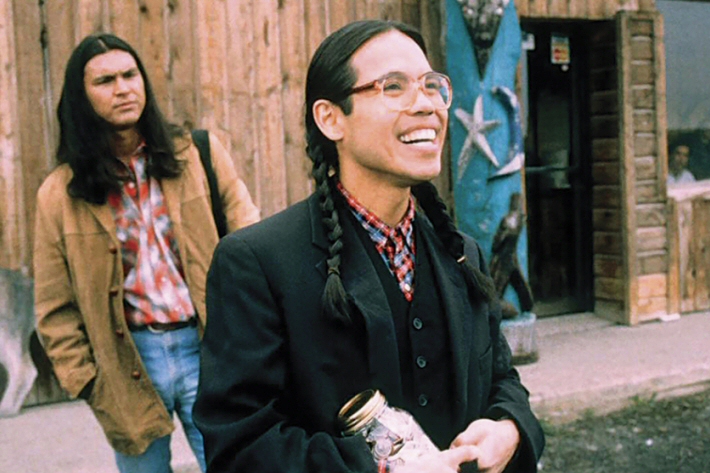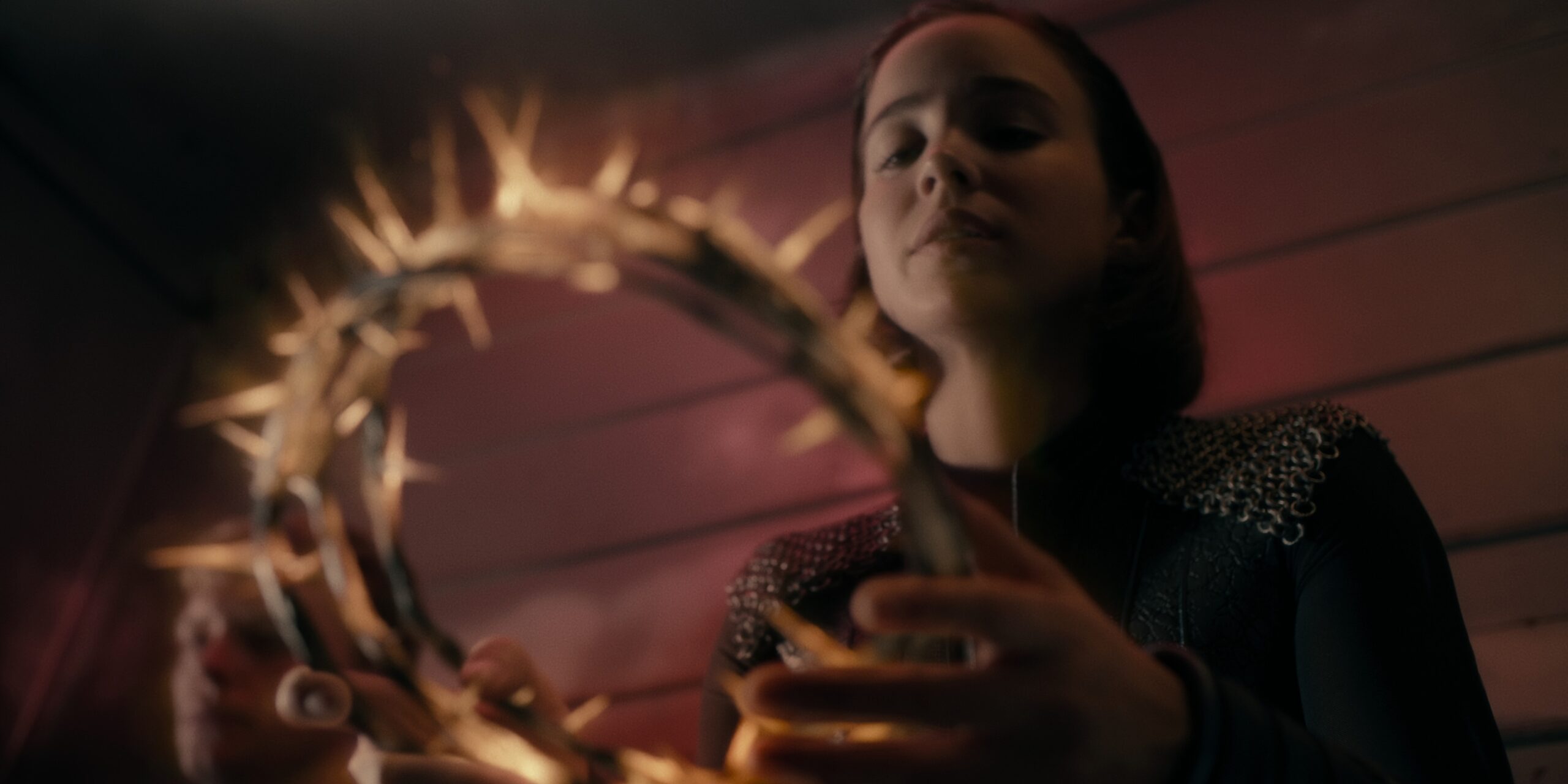Poetic, intimate, ironic, and sharp. Smoke Signals made his debut at Sundance Film Festival in 1998. Even before its release in theathers, the film had won two extremely important prizes. Two awards, the Filmmaker’s Trophy and the Audience Award, which announced its upcoming success.
It was the first film to talk about a pressing subject: the representation of Native Americans in the US cinematographic industry. Smoke Signals is, after all, the first movie written, directed, co-produced, and performed by Native Americans. A movie that finally offers a point of view untarnished by the white man’s storytelling.
Without delving too much into spoiler territory, we want to try and tell you why we think this film will remain, for many and many years to come, an undisputed masterpiece.
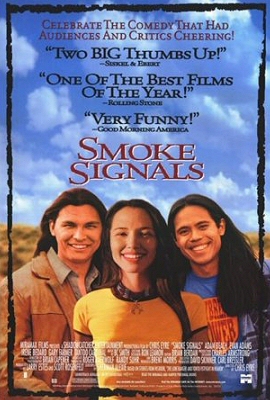
© Miramax
Plot
Thomas and Victor are two Native Americans who live on the Coeur D’Alène Reservation, Idaho. A common thread links the destinies of the two men. A tragic event that happened, quite symbolically, on July 4th, 1976. During Independence Day celebrations, a fire broke out in Thomas’ house. His parents will die, but he will survive thanks to Arnold Joseph, Victor’s father. He was only a newborn back then. Following this event, Arnold will be the binding force of their strange relationship, a man they see under very different lights. Thomas is almost obsessed with him and can’t seem to stop talking about him. Victor has very different feelings for his father who abandoned him when he was only a child. Years later, Arnold will still be the one thing that will bring the two boys together. They will travel to Phoenix in order to recover the ashes of the deceased man.
The film is inspired by a short story that can be found in the Lone Ranger and Tonto Fistfight in Heaven collection, written by Sherman Alexie.
“Me and Victor-we were children born of flame and ash”
The element of fire plays such an important role in the story that can hardly be overstated. The title of the film itself, Smoke Signals, is not a light cultural reference. Fire, smoke, flames, ash. The story is full of events and rhetorical figures that call back to this indomitable element of nature. Fire, rebellious and unrestrainable, can destroy, but it can also create. During that fateful fire, Thomas’ parents died, but, from that same fire, Thomas and Victor were born. Sure enough, the entire evolution of the characters is marked by that event which ends up influencing their destinies. Arnold himself, who seems to have lost something of his own in that fire, will be reborn from his own ashes when his son decides to take care of them.
“You know how Indians feel about signing paper”
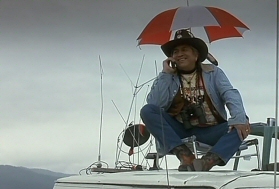
© Miramax
What does it mean to be Indian at the dawn of the 21st century?
Thomas and Victor are very different man who, because of that, end up living their cultural identity in equally different ways. The first is obsessed with the oral tradition of his peoples. Sometimes to the point that it seems like he’s playing the role of a Native American rather than being one in the flesh. Victor, on the other hand, lives his “nativeness” looking to the imposing warriors of the prairies. It’s very obvious that Thomas is meant to embody a natural melting pot of cultures: the one he absorbs on the reservation, from his grandmother’s, with whom he lives, and the one represented in the American pop culture. “How many times have you seen Dances with Wolves, anyways?” Victor asks him teasingly. And yet the idea that a modern Indian should look back to the warriors from the 1500s is shown as equally silly and unfeasible.
Generally speaking, the film gives us the vision of a culture that is very different from what past representations used to offer, both in a good and bad way. Native Americans are neither the savages from westerns, nor the wise and intriguing figures from folktales. Smoke Signals wants to tell us about life in the reservation in an unimpassioned manner. And it does so with such irony to make the story pleasant and engaging. The problems that people have to deal with at Coeur D’Alène are presented one after the other without fear, right from the very first scene. KREZ Radio, the local radio channel on air since 1972, broadcasts the same litany year after year. It is immediately clear that life on the reservation is a boring string of sameness.
We see the portrait of a community that is aware of its limits, capable of reprimanding itself and the oppression by the white man in equal measure. That’s why Geronimo too, one of the most famous Apache leaders in history, is scolded and described only as a “lean, mean, and bloody” man. Qualities that would make him an excellent basketball player.
“It’s a good day to be indigenous”
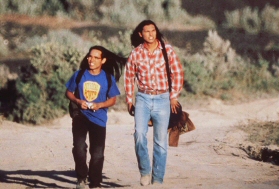
© Miramax
With its self-deprecating spirit, the film gives us parodies of classic quotes like “it’s a good day to die” throughout its entirety. It’s probably a good thing too, since there’s no certain origin for this quote that is sometimes attributed to Running Antelope and sometimes to Low Dog. The film plays with this concept, recognising that the quote is most likely a popular culture heritage rather than a historically reliable Native-American concept. This implies that, if sometimes it’s a good day to day, it could also be a good day to have breakfast, without offending anyone. When seeking the most total candor, Smoke Signals tries to erase that mythical aura that tends to follow Native Americans around. Natives are not some myth or legend, they’re a real living-and-breathing people, and this movie takes every chance to show us that.
Loss and forgiveness
Another important theme of the film is loss. Both Thomas and Victor deal with the absence of something. Thomas lost his parents when he was still a newborn. Victor loses his father when, for unknown reasons, the latter decides to abandon his family. One lives with the loss of a relationship that he never had the chance to experience, the other the loss of a relationship that never lived up to its expectations, the absence of which seems to hurt even more for this very reason. In both instances, the boys search for the essential ability to forgive someone. The entire film seems to lead up to the understanding that without forgiveness, there isn’t any space for something new.
“Tell me what happened, Thomas? Tell me what’s going to happen?”
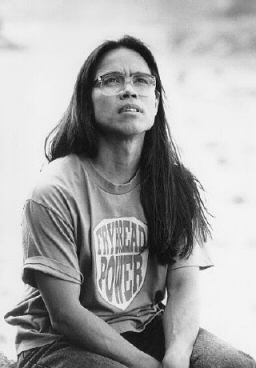
© Miramax
But if this film is really teaching us something about forgiveness, that is that very often forgiving oneself and living with guilt is a lot more complex and insidious than giving forgiveness to others. Right from the start, it is very clear that Arnold Joseph is hiding something. A guilt that haunts him enough to push him to abandon the people he loves most. He will ultimately die without managing to forgive himself even after a life of deprivation. But for reasons that I will not spoil, even such a predictable ending hides nuances that will surprise the audience.
The movie ends with a monologue inspired by Dick Lourie‘s poem, Forgiving our Fathers. Another confirmation that forgiveness is a vital act for moving forward.
Final thoughts
We opened this article by saying that Smoke Signals is a movie about Native Americans made by Native Americans. For years, the press has used this phrase to promote this movie and it is certainly a notable element of the film, we recognise that too. However, this is not just a film about Indians. The themes it covers are such that make this a universal and contemporary story, even after all these years. This film speaks of complicated familial relationships, of the weight that culture and tradition can be for personal identity, of guilt and the paths to atonement. Smoke Signals is not just a movie about Indians, it is a movie about life. It’s no coincidence that Martin Scorsese himself recently added Smoke Signals to the lesson plan of his Filmmaking MasterClass, and you can trust him, right?

© Miramax

